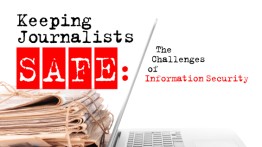Keeping Journalists Safe: The Challenges of Information Security
Thursday, October 22, 2020, 7:30 - 8:45pm

Reporters regularly use digital information platforms to mine huge aggregates of data and to publish their work in the myriad online media outlets. But the dangers of digital media can also pose serious threats to journalists’ safety, as well as the safety of their sources and their information thanks to security breaches, hacking, and the demands of border agencies and other government authorities around the world. Join this panel discussion that will consider the dangers of online reporting for journalists, its impact on journalism, and what can be done to mitigate the damage and protect press freedom.
Register here for this free, online event taking place on Zoom.
Courtney C. Radsch, Ph.D., is advocacy director at the Committee to Protect Journalists, serving as chief spokesperson on global press freedom issues for CPJ. She oversees the organization's engagement with the United Nations, the Internet Governance Forum, and other multilateral institutions as well as CPJ’s campaigns on behalf of journalists killed and imprisoned for their work. She is the author of Cyberactivism and Citizen Journalism in Egypt: Digital Dissidence and Political Change. As a veteran journalist, researcher, and free expression advocate she writes and speaks frequently about the intersection of media, technology, and human rights.
Daniel Kahn Gillmor is a Senior Staff Technologist for ACLU’s Speech, Privacy, and Technology Project, focused on the way our technical infrastructure shapes society and impacts civil liberties. He fosters the creation of new generations of networking and cryptographic protocols designed and optimized for privacy and security. He is an anti-surveillance advocate for privacy, justice, free speech, and data sovereignty.
Sam Keene, associate professor of electrical engineering, is the C.V. Starr Distinguished Research Professor at Cooper's Albert Nerken School of Engineering. He received his Ph.D. from Boston University, where his research has focused on cross-layer techniques to resolve collisions in wireless random-access networks. He also received an interdisciplinary certificate in computational science, where he has worked on remote sensing problems for environmental monitoring. His research interests include wireless communication and networks, signal processing, machine learning and data science.
Benjamin Aranda, assistant professor of architecture at the Irwin S. Chanin School of Architecture, is principal at Aranda\Lasch, an architecture and design studio located in New York and Tucson. Aranda\Lasch designs buildings, installations and furniture through a deep investigation of structure and materials. Recognition includes the United States Artists Award, Young Architects Award, Design Vanguard Award, AD Innovators, and the Architectural League Emerging Voices Award. Aranda\Lasch has exhibited internationally in galleries, museums, design fairs and biennials, and their work is part of the permanent collection of the Museum of Modern Art in New York.
Nithi Subbaian EE'20 ME'21, Civic Digital Fellow, General Services Administration, works on D2D (Data 2 Decisions) to support modern analytics via a loosely-coupled collection of software components that together allow users to transform, process, visualize, and share data products. As a student in a Cooper course, "Hiding from the Eyes of the City," taught by Professors Sam Keene and Ben Aranda, she helped developed a method for obfuscating facial recognition software. The project was exhibited at the 2019 Shenzhen 2019 Bi-City Biennale of Urbanism/Architecture.




